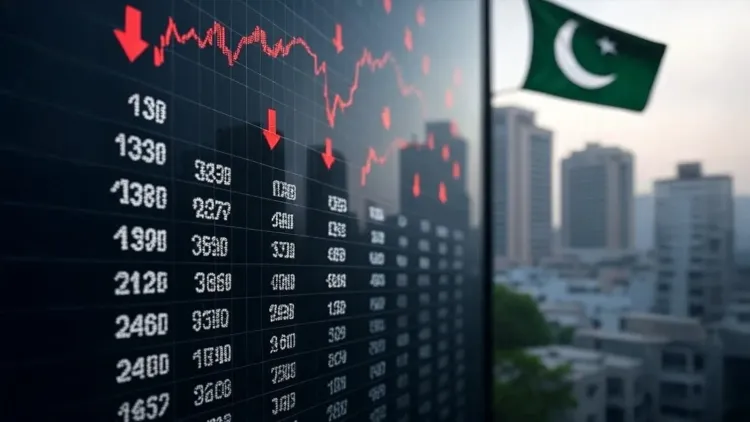Why Are Pakistan Stock Markets Bleeding?

Synopsis
Key Takeaways
- Karachi Stock Exchange experiences significant decline.
- Stock indices have fallen drastically post-terror attack.
- Pakistan's foreign exchange reserves are critically low.
- Country is pursuing loans from the IMF.
- Political instability exacerbates economic challenges.
New Delhi, May 8 (NationPress) The stock exchanges in Pakistan have experienced a significant downturn, with trading suspended at the Karachi Stock Exchange (KSE) due to escalating geopolitical tensions.
On Thursday, the Karachi Stock Exchange witnessed a decline of over 6 percent before trading was halted. This follows a persistent downward trend since the horrific Pahalgam terror attack.
Since April 22, the main index, the KSE-100, has plummeted by more than 13 percent, following the terror attack that resulted in the deaths of 26 individuals, predominantly tourists.
The KSE-100 index, which stood at 118,430 on April 22, has now fallen to 103,060.
Moreover, another index, the KSE-30, has also experienced a decline exceeding 14 percent since the attack.
In light of the dire situation in the stock markets, Pakistan is left with only $15 billion in foreign exchange reserves, teetering on the edge of economic collapse.
The nation is currently pursuing a fresh loan of $1.3 billion from the International Monetary Fund (IMF) to stabilize its economy.
Historically, Pakistan's economy grew at a pace comparable to India's in the early years post-independence, supported by U.S. aid and contributions from wealthy Islamic nations.
However, while democratic India focused on economic progress and poverty alleviation, Pakistan has faced a tumultuous history of military coups and dictatorships, with military generals still exerting influence, exacerbating tensions with its more affluent neighbor.
In 2023, Pakistan was on the verge of sovereign default and required a $3 billion bailout from the IMF.
The country remains heavily reliant on this financial support and is urgently seeking another $1.3 billion loan for climate resilience.
Overall, Pakistan now finds itself in an economic freefall, hindered by political instability and the enduring repercussions of harboring terrorism.









